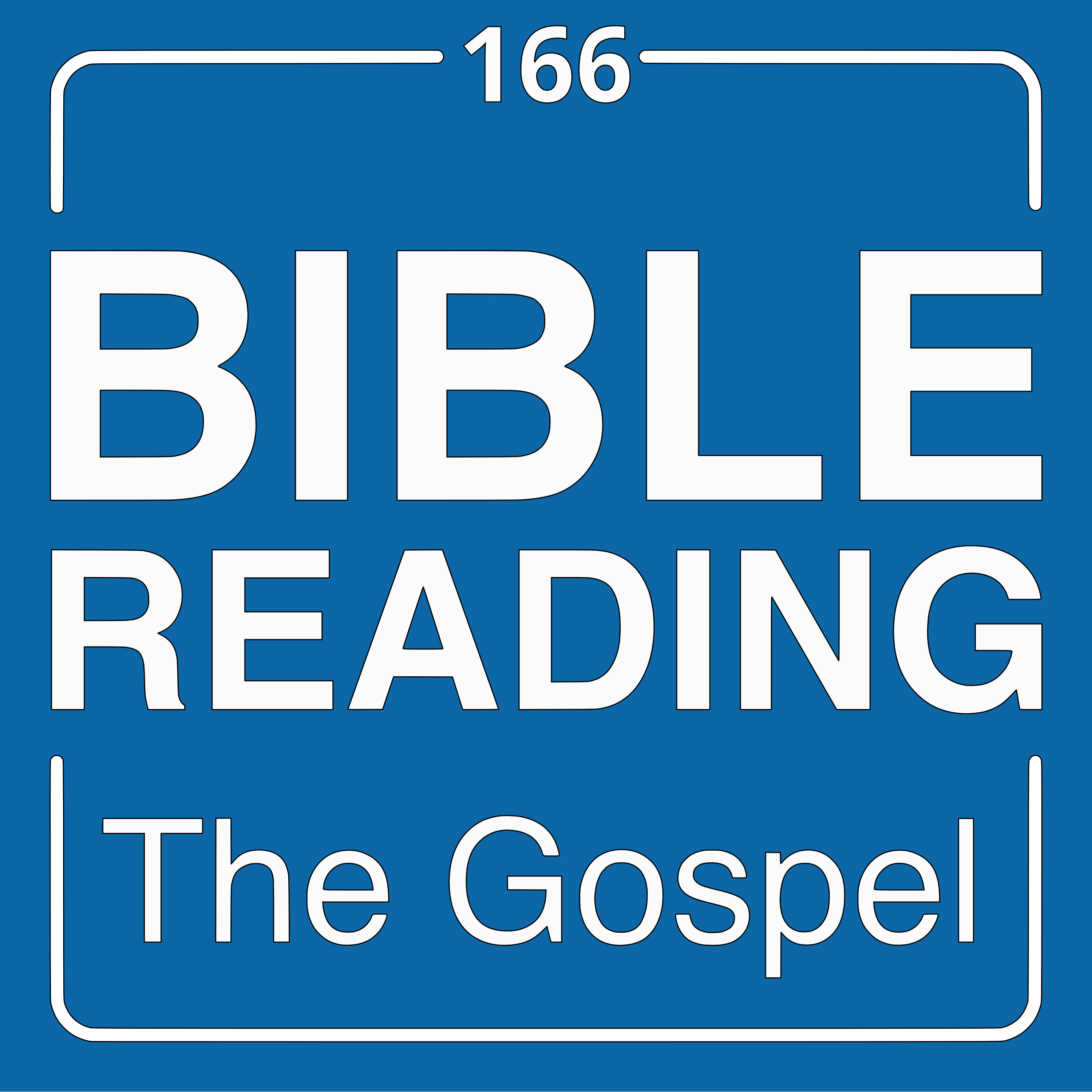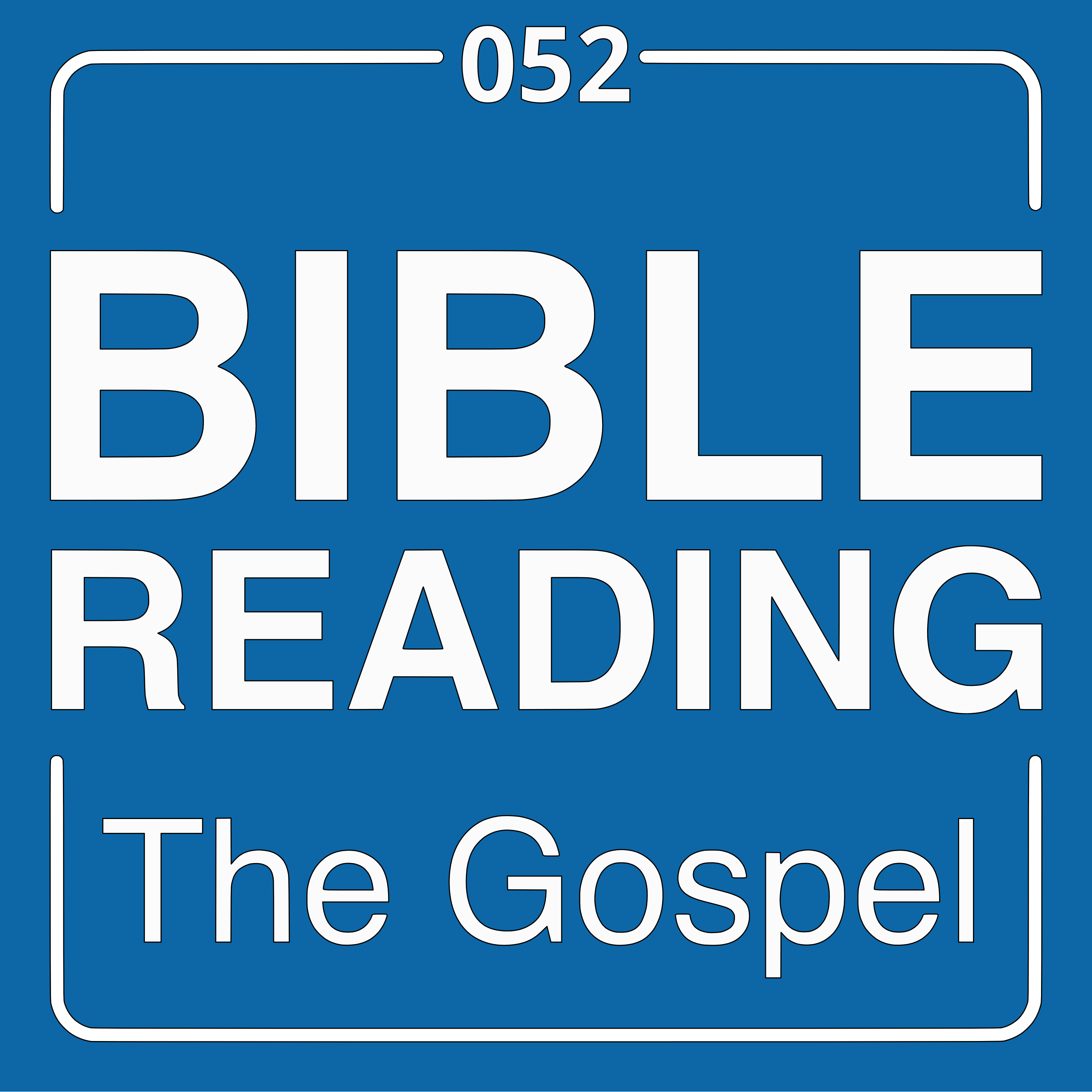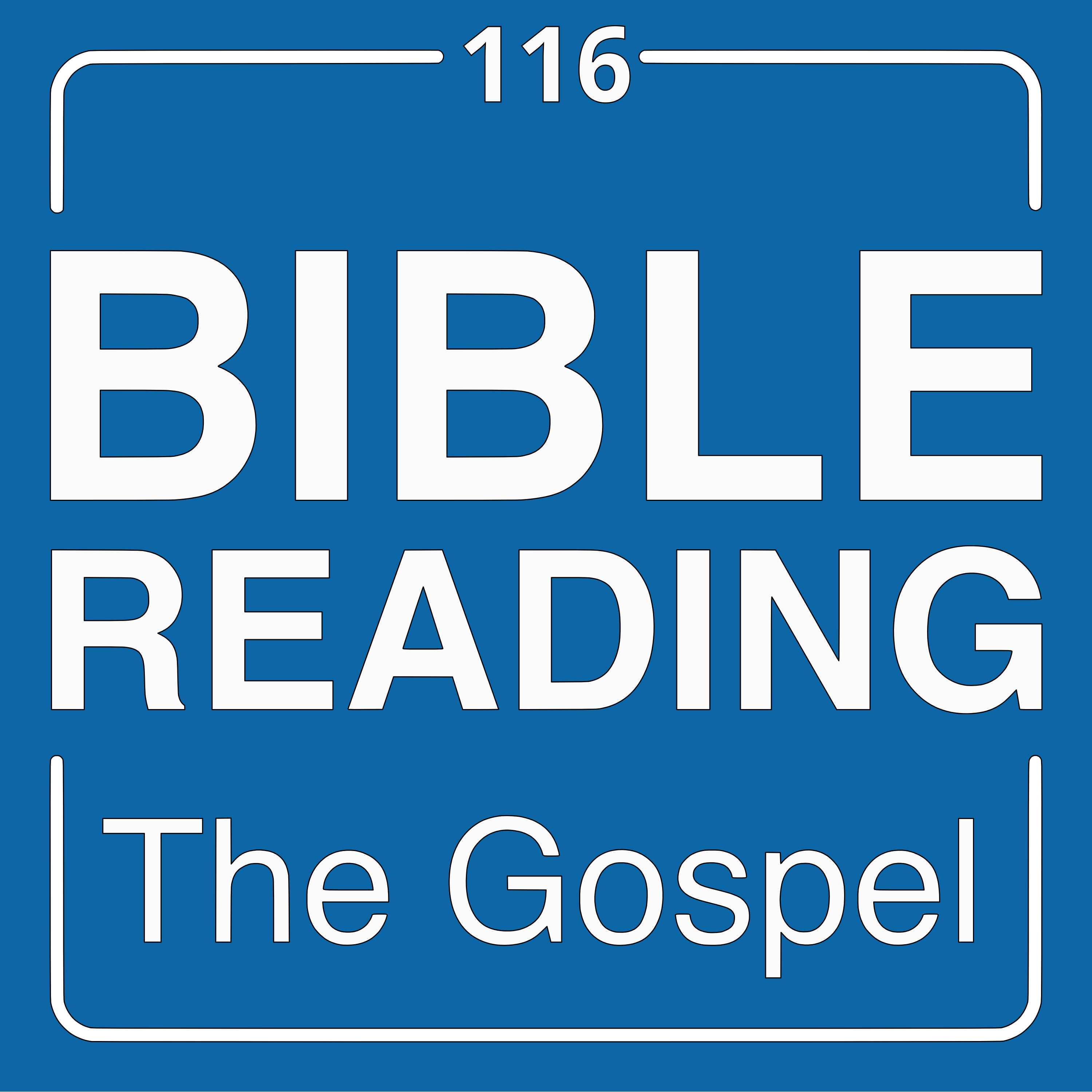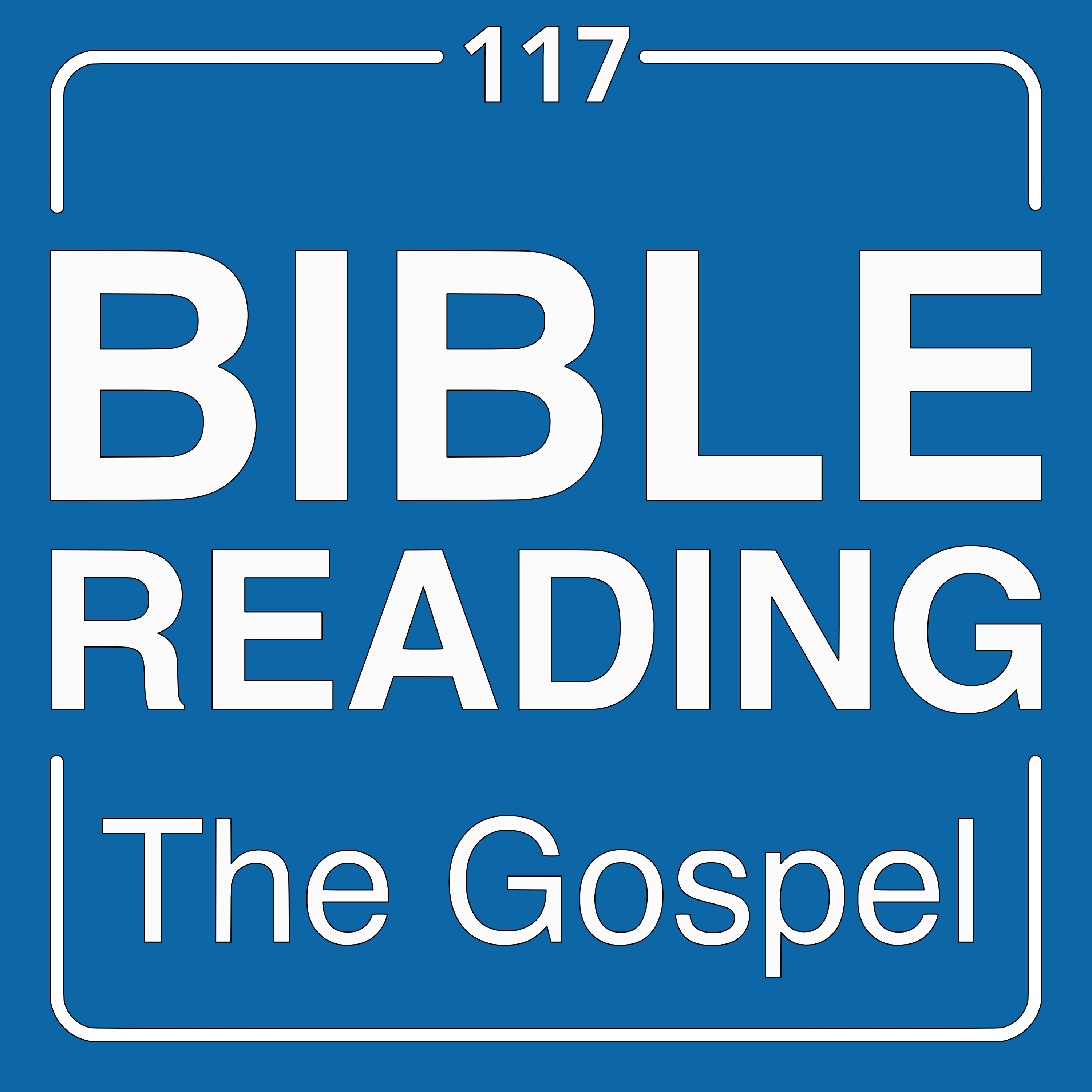Episode Transcript
[00:00:24] Speaker A: Hello, I'm Josh.
[00:00:25] Speaker B: And I'm Gabriel.
[00:00:26] Speaker A: And today on reading the Gospel, we are studying the event Lord's Supper.
This is found in Matthew, chapter 26, verses 26, 29, in Mark, chapter 14, verses 22 through 25, and in Luke, chapter 22, verses 17 through 20.
Follow along with us as we read in Matthew, chapter 26, verses 26, and we will follow up with First Corinthians, chapter 11, verse 23.
[00:01:00] Speaker B: Now, as they were eating, Jesus took bread, and after blessing it, broke it and gave it to the disciples and said, take, eat, this is my body.
And he took a cup, and when he had given thanks, he gave it to them, saying, drink of it, all of you, for this is my blood of the covenant which is poured out for many for the forgiveness of sin.
I tell you, I will not drink again of this fruit of the vine until that day when I drink it new with you in my Father's kingdom.
[00:01:38] Speaker A: And 1 Corinthians 11 says, For I received from the Lord what I also passed on to you. The Lord Jesus, on the night when he was betrayed, took bread, and when he had given thanks, he broke it and said, this is my body, which is for you. Do this in remembrance of me. In the same way after supper he took the cup, saying, this cup is the new covenant in my blood. Do this whenever you drink it, in remembrance of me. For whenever you eat this bread and drink this cup, you proclaim the Lord's death until he comes.
So we've been on a series where we talked about the Passover and foot washing. And now we're coming to this section called the Lord's Supper. Is the Lord's Supper the same thing as Passover, or is it different? How do we understand these?
[00:02:27] Speaker B: That is a very good question because there is a bit of confusion here. But when you read carefully, we understand that both events happened in the upper room at the same time.
And in fact, the Lord's Supper is a part of the Passover process when Jesus Christ took the old elements of the Passover and assigned them a new meaning for the new covenant with him.
[00:02:57] Speaker A: Yeah, and the reason why we read from 1 Corinthians is Paul gives us a little bit more detail in there, and that's actually really interesting because Paul is not one of Jesus disciples, but he says he receives this from Jesus.
How did Paul hear this message from Jesus?
[00:03:17] Speaker B: A couple of years after his conversion, the Apostle Paul said that he went to Arabia maybe to take some time in solitude to reorganize his belief system.
And that time he was taken to the third heaven and he received revelations using his words. That means he had a conversation with Jesus Christ. And Jesus said, paul, you're not there in the upper room. Let me tell you exactly what happened and how to practice it today in the Christian church.
[00:03:55] Speaker A: To me, that gives a lot of significance to this event. That, you know, this is not just some other tradition that we do coming to worship God, singing songs, something. This is. Jesus is spending time with Paul and he brings this up.
He could have brought up any number of things, but he brings up this last supper.
[00:04:21] Speaker B: And I like how the apostle Paul remembers that conversation with Jesus in the night when Jesus was betrayed.
The context is highly emotional.
When something hurts us or when something brings us tremendous joy, we never forget those moments.
And the Lord's Supper is anchored not only in a place, the upper room, not only in a series of ceremonies called Passover or unleavened bread, but it is anchored in an event which was personal and which was very painful the night Jesus was betrayed.
[00:05:10] Speaker A: You said this is part of the Passover.
That Jesus takes this one section of the Passover. And Paul says a new covenant. That Jesus establishes a new covenant in his blood. In Matthew, he says, this is my blood of the covenant which is poured out for you. The old covenant had blood poured out. A lamb was slain. The blood was poured out. And we talked about at the Passover, they painted it on the doorpost. And the angel of death passed over the firstborn in Egypt and did not slay them that evening. But now Jesus is having this new covenant in my blood. What is this new covenant?
[00:05:54] Speaker B: The old covenant was related to the people of Israel at a nation level. Happened at Mount Sinai, when Moses was the mediator of this covenant and a lot of animal sacrifices and blood.
And the old covenant was primarily focusing on the mission of the people of Israel. Of course, that mission was about salvation. They had to have a relationship with God to be able to experience that salvation. Otherwise they could not have communicated it.
But the new covenant is when the Passover was fulfilled into the reality.
And the Lamb of God, about which John the Baptist said, this is the Lamb of God pointing toward Jesus Christ.
When Jesus Christ died on the cross, he was about to die the next day after the Lord's Supper. That is when the new covenant established with every person.
Everyone is called to be a kind of representative of God. Not just a nation, Israel, but every Christian.
It is a covenant of salvation. And it is also a missional covenant.
[00:07:11] Speaker A: I want to switch focus just A little. Jesus says, take, eat. This is my body. Now, there's a big theological word called transubstantiation.
It's a belief that when the bread or the cup is blessed, it actually becomes the literal, physical blood and body of Jesus Christ.
Is that what Jesus is saying here? Take, eat. This is my body? As the disciples ate around the table, were they eating Jesus flesh?
[00:07:44] Speaker B: No, that was a symbolic language. When pointed toward Jesus, this is the lamb of God. They looked and they didn't see a lamb. It was a human being like one of us, Jesus Christ. In the same way, Jesus talks about the bread being a symbol of his body, which was broken for us, and the wine being a symbol of his blood which was poured for us.
[00:08:11] Speaker A: Just like baptism. Baptism is a symbol of our death to old life, our burial under the water, and our birth to new life. It's not that when we baptize someone, you die, literally. Literally go underwater, literally, and come up as a new person, literally.
I do believe that when we go through baptism, there is a change. You know, we're realigning with God, but it's not a literal thing. And so we don't. You know, many, many Christians today believe that it is just a symbol that you're not actually eating the blood and body of Christ.
[00:08:56] Speaker B: Right from the Garden of Eden. When the Lord sacrificed lambs and used their skin to cover the nakedness of Adam and Eve, the lamb was a symbol of the Savior that would come and deliver us from the evil one. During the time of patriarchs like Abraham, when he was asked to bring his son as a sacrifice, the Lord stopped him and said, eden, do that. It's enough. You demonstrated your faithfulness, your allegiance to me in front of the whole universe. Now there is a lamb there that will be the actual sacrifice through from Adam and Eve to the time of patriarchs and later people of Israel, lamb was a symbol of the Savior to come. John the Baptist took it the same way. And this is why we understand that this is a symbol of his body and the wine was a symbol, a representation of his blood.
[00:10:03] Speaker A: Yeah. And so we're called to do this in remembrance of Jesus and not given. We have to do it every day or once a year or it's different. Different churches celebrate different times. Some do it every week, some do it a couple times a year, some do it once a year, as Paul says.
[00:10:21] Speaker B: As often as you do it.
[00:10:23] Speaker A: Yeah. Do it in remembrance of me. And I know as a kid, Communion Sabbaths at my church were you dreaded them.
You didn't want to go because the sermon always went longer. You know, you got out later and when you looked around, half the church was gone. This is a celebration of what God did for us on the cross. Yes, it's terribly sad, but it's also the greatest joy that our sins are forgiven.
When we have smiles on our face, when we are thankful for what God has done, the church fills up. And, you know, we've had to keep adding trays to our communion stack because we're running out of stuff with people wanting to come and celebrate communion. And so I've really enjoyed the new perspective that this is a celebration together to. To be thankful for what God has done for us.
[00:11:25] Speaker B: In remembrance of me, Jesus practically said, I'm not going to be present among you. I'm not going to eat with you, but I'm going to be present through these symbols. Let's celebrate it together.
[00:11:39] Speaker A: I wonder here, when Jesus had given the cup, he says, drink of it, all of you. I wonder if there was a message to Judas because he says, drink of it, all of you, for this is my blood of the covenant which is poured out for many for the forgiveness of sins. And you know, Judas has made this decision. He's going to betray Jesus. He's got the money, he's got that there. And I wonder if Jesus, in saying, all of you, if I was in the room, I wonder if he looked over at Judas that there was still a chance for him at that point to seek forgiveness, that sin was not so great that he could not come.
[00:12:23] Speaker B: Back because the blood will be poured out for many for the forgiveness of sins. So when I hear these words of Jesus, all of you, I include myself first. And I said to myself, forgiveness is available for me. And I encourage anyone to include himself or herself into this, all of you. Because we all are recipients of God's grace.
[00:12:55] Speaker A: But what if they've blasphemed God? What if they've done something, like, really bad?
[00:13:02] Speaker B: Look at Judas. He signed a contract, even took the money in advance to betray Jesus Christ, to sell Jesus Christ for the price of a slave.
And Jesus Christ said, all of you, including Judas, Yeah. We cannot depart too far from the grace of God. The grace of God is everywhere. No matter where you are right now, no matter what you think about what you've done or how you deal with your own conscious, there is always an invitation.
Come to me, all of you.
[00:13:39] Speaker A: Let us pray.
Father God, we are so thankful that you make that bridge for us in our sins. When we have no desire to follow you or to be in your presence. Father, you've made a way that Jesus came and died on the cross for us, for all those sins, for even the sins that are deliberately targeted to hurt you. That Jesus died on the cross for those sins, and he's willing to forgive those sins. If we ask, I pray, Father, that we can ask forgiveness, and that we can ask forgiveness for those that we wronged on this earth, and that we can forgive those who wrong us.
That we can be people who forgive as we desire to be forgiven.
And that, Father, we can enjoy the celebration of communion. We can make this a part of our traditions, make this a part of our lives where we come and celebrate together that Jesus died so that we can have eternal life. We pray these things in his name. Amen.
[00:14:49] Speaker B: Amen.



